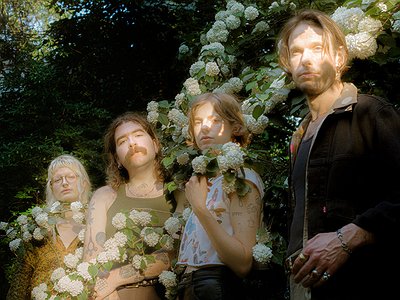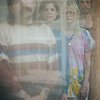Part 2
Take us through a day in your life, from a possible morning routine through to your work, please. Do you have a fixed schedule? How do music and other aspects of your life feed back into each other - do you separate them or instead try to make them blend seamlessly?
Lately my schedule has been waking up around 9 or 10, making espresso, sitting at the table with my coffee and a banana, and reading until about noon. Then I make lunch and watch one episode of, usually, Real Housewives. At that point I’ll try to work on music, whether that’s sitting on the bed trying to write on guitar or going into my tiny studio area to work on recording tracks to my computer. Some days I don’t work on music at all. I don’t try to force it too much if I’m not feeling it because that can make me spiral, but if I feel any little inkling of hope towards music making then I usually try to make time for that at some point in the day. I work a job mostly at night so the daytime has been more productive for me lately.
Can you talk about a breakthrough work, event or performance in your career? Why does it feel special to you? When, why and how did you start working on it, what were some of the motivations and ideas behind it?
When my band Empath released Liberating Guilt and Fear we unexpectedly had a lot positive responses to it. It really carried us to the next level of being a band, from booking DIY shows and releasing music on Bandcamp, to having a booking agent and considering the reception of our music. We started working on it in September of 2017 I think, but it was slowly built upon and mixed for a year and a half. Two of the members and I recorded to tape at a friend’s studio in New York. I don’t think he charged us anything. The idea going into the studio was to record three tracks. We ended up having extra time and improvised a noise jam for 30 minutes, which later got cut down to 9 minutes for the b-side of the cassette.
We took a lot of time to mix LGAF with our good friend and collaborator Shaun Sutkus. We slowly sent mixes and notes back and forth. Then Randall joined the band and we added his synth parts and I added bass guitar. More mixing ensued. We asked Deerhoof drummer Greg Saunier to master the tracks when we opened for them in Philly, and he graciously agreed. Get Better Records offered to release it for us on cassette. I gave Alex who runs the label a list of publications to send the release to because I thought “why not see what happens”. We unexpectedly got a lot of attention for it in the indie rock world. That was the catalyst for everything we’ve been able to do as a band since then.
There are many descriptions of the ideal state of mind for being creative. What is it like for you? What supports this ideal state of mind and what are distractions? Are there strategies to enter into this state more easily?
For me it’s about ingesting other forms of art and media and having solitude in order to process thoughts and feelings. Also communicating about art and media I like with other people, becoming inspired through seeing their perspective on something, and then again having solitude to process. Just sitting alone in general with thoughts and feelings until I feel myself needing an outlet.
Music and sounds can heal, but they can also hurt. Do you personally have experiences with either or both of these? Where do you personally see the biggest need and potential for music as a tool for healing?
I don’t know if I have personally experienced music and sound hurting me, except maybe in the sense that it enhanced a certain state of mind I was in. Like a piece of music making me feel emotional in a way that was uncomfortable. For me music has always been about creating a fantasy to escape to, which gives me a sense of hope. I think it’s important for people to spend time in their inner worlds and daydreaming. Music and sound can certainly help with that.
There is a fine line between cultural exchange and appropriation. What are your thoughts on the limits of copying, using cultural signs and symbols and the cultural/social/gender specificity of art?
I think everyone will fall on a different place along the spectrum of this issue. Very generally, I think copying is helpful when creating. I also don’t think you should draw too heavily from your influences. Caricature should generally be avoided. I feel hesitant about placing firm restrictions on what people should or shouldn’t do when it comes to art, however, people should be open to criticism and expect to be asked “why”.
Our sense of hearing shares intriguing connections to other senses. From your experience, what are some of the most inspiring overlaps between different senses - and what do they tell us about the way our senses work?
The first thing that comes to mind is “ambiance” and how it affects my experience of everything. Things taste better, sound better, feel better when the atmosphere of the room I’m in hits right.
Art can be a purpose in its own right, but it can also directly feed back into everyday life, take on a social and political role and lead to more engagement. Can you describe your approach to art and being an artist?
The approach is finding something that interests me and exploring it, trusting my taste to guide me. Interests can be something as simple as ‘what if a song was only two chords’ or ‘what if I ran all the tracks separately into a reel to reel then into a tape machine’, or something more abstract like exploring the feelings of distance between people or feeling alienated from god. Usually a song will contain a combination of many things I’m interested in and trying to explore.
What can music express about life and death which other forms of art may not?
I think because people naturally connect to sound, music is probably the least hindered, most universal way of expressing a feeling artistically.






